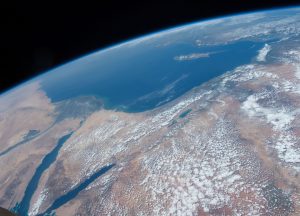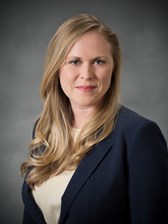
Weather in space is not something you regularly hear about, but it has an everyday impact we should all be aware of. As part of SpaceWatch Middle East’s partnership with Secure World Foundation, we are pleased to publish this essay on space weather and space sustainability by SWF’s Project Manager, Krystal Wilson:
Space weather may sound like an issue invented by Hollywood to threaten fictional space explorers, or at least something distant that would not affect your daily activities, but it’s a real natural phenomenon with potentially significant impacts on space sustainability and for everyday life. Space weather refers to a group of physical processes that begin as the Sun emits energy and ultimately end by affecting human activities on Earth and in space. NASA describes this process as:
“the Sun regularly releases a constant stream of magnetic solar material called the solar wind, along with occasional huge clouds of solar material called coronal mass ejections. This material interacts with Earth’s magnetic field, causing temporary changes. These changes produce effects that range from mild such as the aurora borealis to more extreme such as electric power grid blackouts.”
Space weather can also impact satellites by damaging onboard electronics and disrupting communications or navigation signals, leading to temporary service disruptions and a long-term degradation of spacecraft reliability and lifetime.
As highlighted by Secure World Foundation in a number of fora, a growing number of actors are using outer space for an increasing variety of socio-economic and national security benefits. Many of these space activities use the same regions of Earth orbit—leading to crowding of potential physical and electrometric interference. Unsafe or irresponsible actions by one actor can have long-term consequences for everyone. By working to ensure space sustainability, we can prevent the cost of using space from increasing and ensure the socio-economic and national security benefits derived from continue.
Although space weather is a national phenomenon that is not caused by human activity, it still plays an important role in space sustainability. For instance, if a satellite operator does not know whether a satellite was damaged by space weather or by hostile action there is an increased chance for terrestrial conflict, particularly if there is already a tense geopolitical situation occurring. Recent research on now-unclassified materials details how this exact scenario played out in 1967 during a major solar storm. Space weather can also affect the orbital debris population as years with a lot of solar activity can see an increase in the rate of orbital decay.
Secure World Foundation works with a variety of partners to raise awareness of space weather effects including ongoing efforts to study and mitigate the phenomenon. In 2016, SWF and the U.S. State Department co-sponsored “Space Weather as a Global Challenge,” a panel presentation and discussion on the measures that need to be taken internationally to protect the operations of satellites and aircraft, communication networks, navigation systems, and the electrical power grid from the risks posed by solar flares, solar energetic particles, and coronal mass ejections. On May 22, 2017, we were pleased to build on that first dialogue with the second “Space Weather as a Global Challenge,” organized by the State Department, the Italian Embassy, and SWF. Held at the Italian Embassy in Washington, DC, the event highlighted the importance of addressing the threats of space weather and provided updates on progress made toward implementing the U.S. National Space Weather Strategy & Action Plan and advances in addressing the threat of space weather in Italy, Europe, and beyond.
In his opening remarks, Dr. Jonathan Margolis, Acting Deputy Assistant Secretary for Science, Space, and Health, U.S. Department of State emphasized the importance of space weather for everyone, saying:
“It [space weather] has economic implications, safety implications, human health implications, national security implications. As we all know, as we become more and more interdependent on communication networks, navigation system, and electrical power grids, across borders, the impact of space weather can not only be a national incident. It can be an international concern.”
The other speakers discussed the economic, safety, health, and national security implications of space weather events, as well as the steps the international community is taking to mitigate the threat of a severe event. Attendees heard in detail about the selection of space weather as a thematic priority for UNISPACE+50, a special segment of the 61st session of the Committee on the Peaceful Uses of Outer Space taking place in July 2018. To see the agenda, presentations, audio recording, and transcripts, please visit our event page.
Secure World Foundation will continue supporting efforts to bring together U.S. and international experts from government, industry, and academia to consider existing and future efforts to improve collaboration on space weather-related policies, research, and forecasting programs, as well as risk management activities. We believe these collaborative approaches will be even more important to address common challenges as the global community continues to rely on space activities, now and in the future.
In that light, SWF is co-sponsoring, with the National Space Weather Partnership, the 2017 Space Weather Enterprise Forum on June 27, 2017 in Washington, DC. This annual forum brings together a blended audience of space weather experts from both research and operations, space weather users from the public and private sectors, academia, international representatives, and policy makers. This year’s theme is “Implementing a National Space Weather Partnership” and panelists will explain how space weather science and infrastructure benefits the public; discuss vulnerabilities of our technological infrastructure to space weather impacts; report on the status of the National Space Weather Strategy, Action Plan, and Executive order to improve national space weather capabilities; and examine roles and partnership opportunities between the government, commercial, and academic stakeholders.

Krystal Wilson is a Project Manager at Secure World Foundation and has over 10 years of international and domestic space, public policy, and management experience. Prior to joining SWF, Ms. Wilson was a consultant at Access Partnership, where she worked with international satellite service providers and other leading technology companies on policy issues related to spectrum management, emergency communications, telecommunications standards, orbital debris, and multilateral processes including representing industry at the Inter-American Telecommunication Commission. She has also served as a project manager at the Tauri Group, a leading aerospace analytics firm, providing research, analysis, strategic planning, and regulatory assessment to government and commercial clients. She led and supported production of NASA’s strategic plans, audits, performance plans, budgets, and annual reports. Her work exposed to the full range of NASA’s Earth observation, human exploration, and aviation programs. In that role, she was also recognized as a key member of a data management team that received the NASA Group Achievement Award. Previously, Ms. Wilson was in the field of international development as a Monitoring and Evaluation Manager at Development Alternatives, Inc in Afghanistan working on US military and local government initiatives and as Senior Program Assistant at the National Democratic Institute in Africa and Washington, DC working on sustainable governance projects. In those roles, she worked closely with the United Nations, the World Bank, the Department of State, the Department of Defense, US and international nonprofits, and others. Ms. Wilson holds a BSFS in International Politics from Georgetown University’s School of Foreign Service in Washington, DC and completed the Programme Internationale at Sciences-Po in Paris, France.
Original publishe at: https://spacewatch.global/2017/07/space-weather-sustainability-issue/
 SpaceWatch.Global An independent perspective on space
SpaceWatch.Global An independent perspective on space

